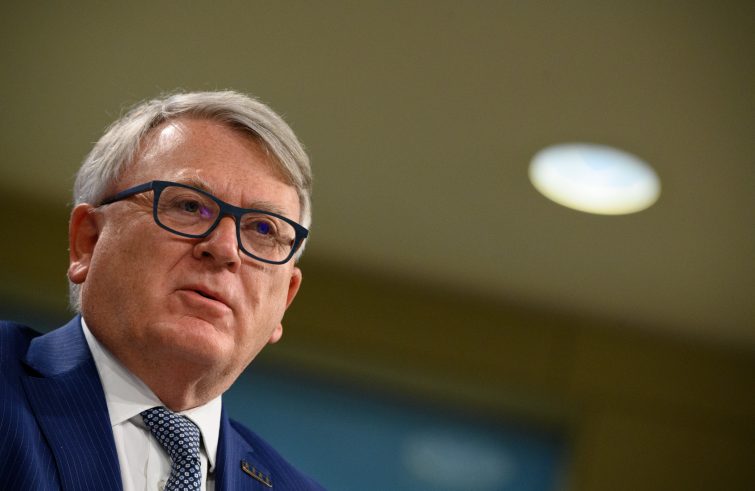
“The Recovery Fund must be translated into job creation and decent wages for citizens to ensure a future for themselves and their children”, said EU Commissioner for Jobs and Social Rights Nicolas Schmit during a meeting in Brussels with SIR on EU recovery strategies and the launch of a European Platform for Combating Homelessness. “What does Recovery mean? It certainly means kick-starting the economy, and indeed the economy of citizens”, Schmit emphasised.
Wage disparities. For the Commissioner, pay and employment gap between young and older workers and between women and men remains all too deep, especially in this pandemic year. “Gender pay gap should no longer exist, yet it remains widespread throughout Europe, including in the northern countries,” Schmit said. “And there are still too many young people with precarious jobs.” The latest Eurostat figures show that the employment rate in the EU stood at 78.1% for men and 66.8% for women. Thus, a gender gap of 11.3 % continues to exist, albeit slightly reduced compared to 11.7 % in 2019.
Overall, Italy is second last in Europe with an employment rate of 62.6%, right behind Greece with 61.1%.
Northern Europe has the highest employment rate, with Sweden at 80.8%. “We are in the process of developing policies to bridge the generational and gender gap in the workplace. Some workers are overly protected while others are not protected at all. It’ s important to establish a balance to create jobs for young people whilst protecting those who lose their jobs,” Schmit explained.
 An Italian problem. According to the European Commissioner, Italy is among the countries registering “a markedly low rate of female employment, with wage differences between male and female workers.” Therefore, “providing increased support to women accessing the labour market” is a matter of utmost urgency. Not enough young women are digitally literate,” Schmit pointed out. Adequate childcare services are still lacking in many EU countries. “These services – he added – bridge the gap between poor and wealthy families.” National governments also need to focus on “adapting education systems to changes in the labour market”, especially by encouraging apprenticeships for young people to gain new skills.
An Italian problem. According to the European Commissioner, Italy is among the countries registering “a markedly low rate of female employment, with wage differences between male and female workers.” Therefore, “providing increased support to women accessing the labour market” is a matter of utmost urgency. Not enough young women are digitally literate,” Schmit pointed out. Adequate childcare services are still lacking in many EU countries. “These services – he added – bridge the gap between poor and wealthy families.” National governments also need to focus on “adapting education systems to changes in the labour market”, especially by encouraging apprenticeships for young people to gain new skills.
Digital education and environmentally sustainable activities. “Young people should have the right to build their life, have a family. But if they have a precarious job this is not possible,” he said. Therefore, the plans must “focus on investing in digital education, sustainable jobs and eco-friendly activities” to
ensure that economic and industrial recovery fosters “economic and social dynamism, especially in the most economically disadvantaged regions.”
For the Commissioner, a key tool for supporting disadvantaged regions “is tax advantage”, to be applied, for example, in Southern Italy. This is an initiative that the EU Commission fully supports for economic recovery. The Italian plan is now being approved by the EU Commission – President Von der Leyen will be meeting Italian Prime Minister Mario Draghi in Rome today – for the disbursement of a 13% pre-financing (approximately EUR 25 billion). In addition to reviving the economy, the EU is also committed to combating poverty with targeted policies.
Homelessness in the EU and in Italy. At a recent high-level conference in Lisbon for launching the European Platform on Combating Homelessness, ministers and representatives of EU institutions, NGOs and social partners, including Feantsa, issued a joint Declaration. “No one must sleeps rough for lack of accessible, safe and appropriate emergency accommodation, or live emergency or transitional accommodation longer than is required for successful move-on to a permanent housing solution”, reads the Declaration. “No one must be discharged from any institution (e.g. prison, hospital, care facility) without an offer of appropriate housing.” Furthermore, the signatories recommend to avoid evictions without assistance for an appropriate housing solution. Most importantly, “no one must be discriminated against due to their homelessness.” “There are thousands of homeless people across Europe, living on the streets of big cities, many of them trying to reach countries in the South, but this phenomenon is happening in all countries,” Schmit said. The initiative will also serve to share good practices between EU countries. Finally, the Commissioner reiterated that “the phenomenon of homelessness in Italy also involves refugees and migrants.”









